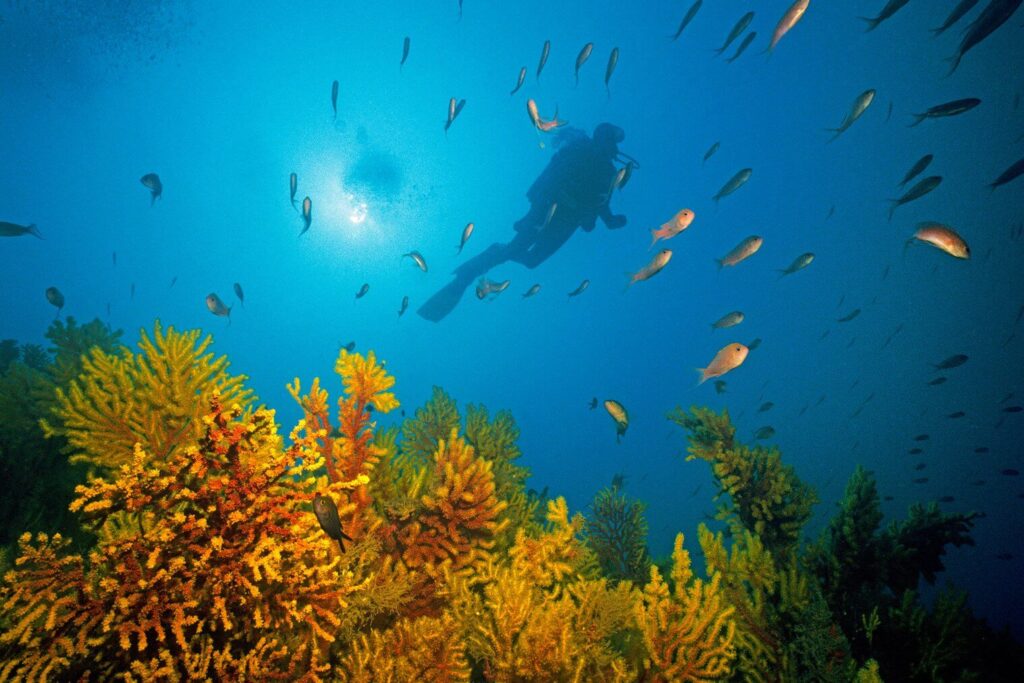
Diver in Costa Brava, Spain. Helmut Corneli / Alamy Stock Photo.
The ocean is the planet’s largest ‘carbon sink’, absorbing around one quarter of annual global carbon dioxide emissions. This is not simply a chemical process; but a phenomenal biological pump filled with trillions of active carbon engineers, namely plankton, fish and whales, who cycle and recycle energy and carbon throughout the ocean every day. This carbon sink – the ocean’s biological pump – relies on mangroves, seagrasses and seabeds to store the carbon away for hundreds or thousands of years. A healthy ocean is clearly of critical importance to the functioning of Earth’s planetary systems, not least of which is the climate. Despite this staggering reality, the ocean is one of the most overlooked tools we have for mitigating the impact of climate change.
This amazing oceanic system, however, is in danger of collapse, largely due to unrelenting pressure from fishing. In particular, destructive fishing, like bottom trawling, is driving the loss of marine biodiversity, weakening the biological pump, and diminishing the resilience of marine life to the effects of climate change. Above the surface, fishing fleets belch out millions of tonnes of CO2 every year, fuelled by state subsidies, while bottom-trawlers plough up and disturb carbon-rich seabeds, habitats and wildlife.
These impacts on the ocean provide yet more evidence that we are stressing the limits of planetary boundaries, the potential consequences of which threaten societal collapse. We need to educate, organise and act in ways commensurate with that threat. In December at the Kunming-Montreal Global biodiversity framework governments committed to protecting 30 percent of the planet’s ocean and land by 2030 and to ensuring that “agriculture, aquaculture, fisheries and forestry are managed sustainably, in particular through the sustainable use of biodiversity”. They must now follow these commitments with immediate action.
We have seven years – that’s seven harvests, two Olympic Games, two football World Cups, seven Eurovision song contests. This time will pass quickly and we have limited opportunities for decisive action. However, the ocean and fisheries management are intertwined and provide a scarce opportunity to take action for climate, biodiversity, and the wellbeing and livelihoods of dependent communities.
The scientific evidence and experience of those working on the ocean is clear: reducing fishing pressure most often results in rebuilt fish populations, which deliver as much or more fish, with less effort (and burn less fossil fuels). This is a rare and desperately needed win-win for the ocean and for fishers.
The European Commission has been struggling to realise this reality for over ten years. Its latest attempt – published recently – is neither ambitious nor comprehensive enough – it outlines baby steps when we need giant leaps. However, it does outline how to transition the fishing industry to one that is low impact and low carbon, including the mapping of seabed carbon stores and the impact of bottom trawling on them; removing trawling from Marine Protected Areas; and applying transparent environmental, social and economic criteria when allocating access to fishing resources. Faced with the current climate and biodiversity emergency, these measures should be within the scope of EU member states to adopt.
For too long, fishing and the fishing communities have been out of sight of senior EU decision-makers and have not featured in their decision-making. They, along with the ocean and all of its many carbon engineers, deserve to be in the spotlight as governments deliver decisive and significant action while ensuring a just transition to a low impact, low carbon, resilient future. By working with the European Commission and member state governments, civil society must cut through the thick layers of rhetoric to deliver for the ocean, its engineers, fisheries and communities. We do not have time for anything less.
Rebecca Hubbard, Program Director, Our Fish
